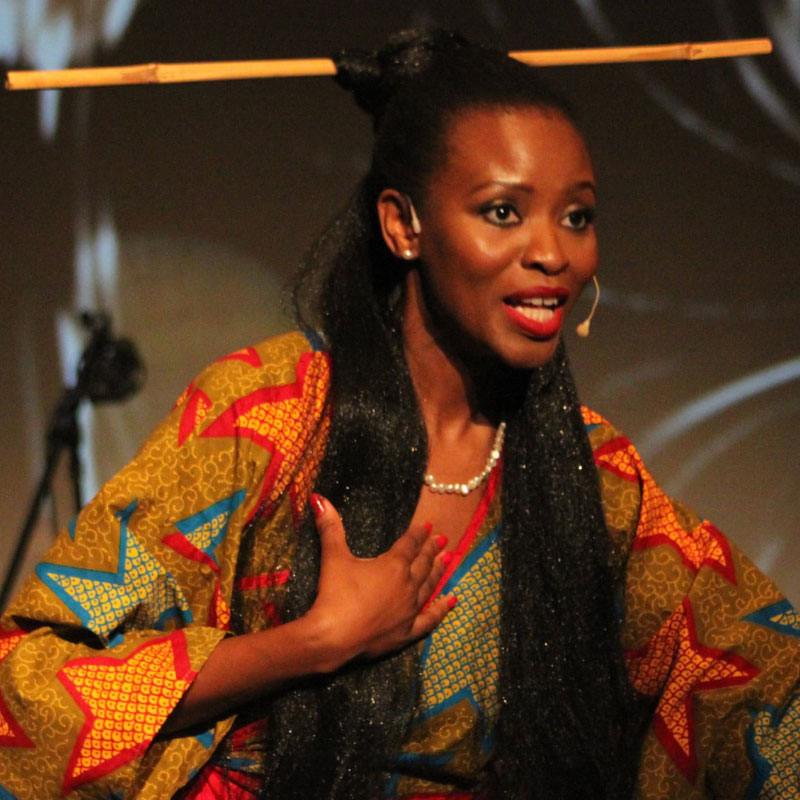
I’m going to pidgin this up
I’m Going to Pidgin This Up
Inspired by Wagner, Nigerian Helen Parker-Jayne Isisbor’s quest to champion her often-derided west African vernacular has spawned the first pidgin opera.
Mami Wata, Africa’s answer to the mermaids and sirens sprinkled throughout folklore the world over, rises from the waters and sways to the beat of hand drums. “Dey use dem bad medicine to scare, to bring you down,” she sings, her voice punctuated by stringed instruments, an electric guitar and a steel pan that gives the sound a haunting edge.
This is opera, but not as you know it: it is the world’s first opera in pidgin, the language spoken by some 50 million people in West Africa’s most populous nation of Nigeria, alongside variants in Ghana, Sierra Leone and Liberia, and it debuted in London last week.
Song Queen: A Pidgin Opera came about after Nigerian-born Helen Parker-Jayne Isibor, also known by her artistic name, The Venus Bushfires, watched a recital of Richard Wagner’s opera, Parsifal. That began a four-year labour of love aimed at convincing audiences that an artform most closely associated with classical Romance languages could blend with a vernacular often seen as lacking prestige.
“I went to the opera wearing my ankara,” Isibor explained, indicating her jewel-bright Nigerian clothes, which caused a stir among the black-tie wearing opera regulars. “And I thought, actually, I’m going to pidgin this entire situation up!”
Scoring pidgin’s clipped, concise tone was “difficult”, she said, but the final result is a West African-flavoured twist centred on the water spirits that lure men or sailors to their deaths in countless mythologies.
“My grandmother knew so many Mami Water stories because her own mother had told her these stories too,” Isibor explained, her hair spun in the signature elaborate updos she sports on stage. “It’s everywhere from Greek mythology to mermaids, so it’s something that translates well across the board.”
The show is the latest in a renewed burst of Afrofuturism – where conceptual artists reimagine black-related themes. The organisers hope its debut at the world’s largest festival of new opera, which opened in London last week, will eventually lead them to Nigeria and beyond.
Other differences mark Song Queen out from the standard orchestral canon. Soprano, mezzo, tenors, violins and cellos sing to the pace of talking drums traditionally used by griots, traditional storytellers, across West Africa, and the music is shot through with the udu – a clay water drum found in south-east Nigeria. The centrepiece is Isibor’s hang – a UFO-shaped percussion drum so rare waiting lists to acquire one can stretch for years.
“A lot of people [in Nigeria] said, why do you want to sing in pidgin? And I thought, well, why not? It’s the language the average Nigerian understands,” said Isibor. Her collective of international musicians can’t always perfect the accent, so they simply sing it in their own accents – fittingly for a language that draws from so many indigenous languages that various ethnic groups claim it as their own in Nigeria.
“You’re the Pavarotti of Nigerian opera!” exclaimed one happy viewer post-show last week, rushing over to shake hands with Baba Epega, a classically-trained musician who had appeared on stage dressed in traditional flowing agbada robes.
Lawyer Roger Makanjuola, speaking above the crowd of British and Nigerian accents, said the wave of Nigerian pop artists breaking through internationally had helped his own British-born children identify with the country. “I think Nigerian music is ripe for the international stage. In a way it’s a shame because a lot of the young big-timers are moving away from the more traditional music but you can’t blame them for also trying to make their roots more modern,” he said.
Others are fighting against the tide of sugary dancehall music. Isibor is among them: “I don’t have the kind of face most people link
to opera. I hope that people look at me and even if they don’t go into opera music specifically, they can think: you don’t have to shake your bum-bum, take your clothes off, it doesn’t have to be auto-tune.”




